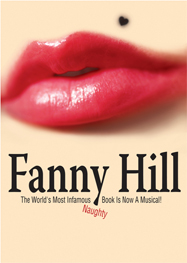[threecol_two]
 Fanny Hill
Fanny Hill
by Michael Dale
February 20, 2006
While sitting in a theatre a few nights before seeing Ed Dixon’s (book, music and lyrics) new musical adaptation of John Cleland’s scandalous 1749 novel, Fanny Hill, the woman sitting next to me noticed the full-page ad for the show in her Playbill and commented to her companion… “They’re making a musical out of Fanny Hill?”
I wouldn’t be surprised if Ed Dixon hears that sort of thing a lot. His last New York outing was an adventurous and musically complex adaptation of A.R. Gurney’s play based on Edwin Arlington Robinson’s poem Richard Corey. In Fanny Hill, Dixon replicates the sound of English ballad opera, a musical theatre form that hasn’t exactly been popular in these parts for the last couple of centuries, in a story chock full of smutty boys, saucy girls, dirty old men and one lovable lass who learns the monetary value of an attractive young figure. There is much in the show that works beautifully, especially in the swift-moving and funny second act that soars above its predecessor. But a very promising work in progress.
With not much else to do while sitting around in debtor’s prison, Cleland wrote what is generally regarded as the first erotic novel, most famous in this country for helping to popularize the term “banned in Boston.” Its full title being Fanny Hill, a Memoir of a Woman of Pleasure, the book was banned for obscenity in this country until it was released in 1963 as John Cleland’s Memoirs of a Woman of Pleasure. After the Commonwealth of Massachuseuts tried to makes sales of the book illegal, the publisher took his case to the U.S. Supreme Court, where it was judged to have at least some redeeming social value. The ban was lifted, the legal definition of what was considered constitutionally obscene became nearly indefinable, and soon afterwards Boston had its first red light district, known as The Combat Zone.
The story is rather simple, leaving room, in the novel, for about three dozen sex scenes. The less explicit musical has songs instead. Fifteen-year-old orphan, Fanny, an obscenely innocent country girl, sets out for London to seek her fortune. When things don’t go exactly as planned she’s offered a room in Mrs. Brown’s bawdy house, unaware why the ladies known as her “cousins” are able to afford such fine clothes. After falling for an equally innocent sailor, Fanny appears on her way to living happily ever after. But fate steps in and a hardened Fanny, sans hubby, returns to the brothel and sets out to become the top (or bottom, if you please) in her profession.
You couldn’t ask for a more appropriate musical actress in the title role than Nancy Anderson. Though known among frequent New York theatregoers, her airy soprano that can easily float through large theatres unamplified is a sound that recalls a bygone era and is rarely used in contemporary musicals. Intelligently using her sweet, scrubbed-up looks, golden locks and saucer eyes, Anderson projects a naiveté that never crosses over into flat-out stupidity. Dixon and director James Brennan provide her with plenty of endearing funny business, particularly when matched with a terrifically earnest Tony Yazbeck as her equally naïve sailor beau. Their chance meeting when Fanny trips and falls on top of him and they proceed to play out a love scene and song without ever moving from that position is a scream. And her second act scene and song with the well endowed young servant (a heavily padded, I assume, and very funny Adam Monley) is likewise a highlight.
The score’s best song is a show stopping ribald number for Patti Allison, as the brothel owner describing the many men she’s had. (I won’t reveal the wonderful comic twist Dixon gives to this standard type of song.) The built-in encores are well deserved… Emily Skinner, though certainly a well-known Broadway actress, has a small role as Mrs. Brown’s maid, with one solo ballad that hints of a relationship between her character and Fanny, which is never developed. Christianne Tisdale and Gina Ferrall also have their fun moments as ladies of the night and day.
Dixon’s book is at its best when playing off the innocence of the lovers (“I am even happier now than I was when I had never been so happy.”) Michael Bottari and Ronald Case’s elaborate (for the small York Theatre) set is functional, but can use some splashes of color to look like it was meant to go along with their cheerier assortment of costumes.
With its stronger second act, Fanny Hill will most likely send audiences out with only faint memories of its less inspired opening sequence… But even in its bumpy state, Dixon’s got a pretty nice Fanny.
[/threecol_two] [threecol_one_last]
[button link=”https://miracleor2.com/product/fanny-hill/”]Request Perusal[/button]
[button link=”https://miracleor2.com/licensing-form/”]Licensing Form[/button]
click the logos below for more
Press & Reviews

![]()



[/threecol_one_last]
